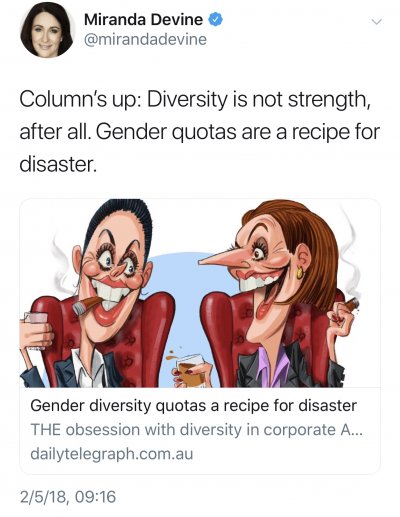Well before Catherine Brenner became something of a sacrificial lamb at the AMP mea culpa altar, followed by Holly Kramer, Vanessa Wallace and Patty Akopiantz, many women were already scouring media coverage of the banking royal commission wondering why the financial press was suddenly fixated on women. There they were front page, day after day, hapless dames, snapped in situ giving evidence, or arriving and leaving the building looking awkward and guilty.
We could see where this was heading.
Corporate corruption was the fault of women who, by virtue of their gender, are fundamentally inexperienced, unqualified and incapable of making good decisions
As a media veteran of some three decades, I know how quickly a story angle can overtake the detail and become the story itself. But this one – blame women on boards – hit with lightning speed. And extraordinary certainty. The Telegraph headline, ‘Gender diversity quotas a recipe for disaster,’ was comical. For a minute. Until within hours it morphed into media fact. Corporate corruption was the fault of women who, by virtue of their gender, are fundamentally inexperienced, unqualified and incapable of making good decisions. Diversity – it seems – is the new devil.
Journalist Miranda Devine’s clarity of conviction was breathtaking nonsense, but her comments were repeated with nodding agreement: “The corporate sector’s obsession with diversity has failed,” she tweeted, “and parachuting more women into powerful positions is more likely to cause conflict than create an ethical nirvana.”

Columnist Janet Albrechtsen chimed in with a “genuine hooray” that “finally some brave souls” were raising serious questions about the “consequences of the rapid push for targets and quotas for women” and the “dirty little secret of corporate Australia” was finally out.
What followed in mainstream media was an extraordinary dissection of so called gender traits and women’s ‘fitness’ for leadership. With ludicrous and unedifying commentary filling the airwaves and polluting news feeds, it was difficult to hold a serious discussion around the central insult that suggested women were being “gifted” corporate gigs for which they had no claim.
This ugly episode of media fascination with female failure and blame should alert corporate Australia to how deeply entrenched sexist beliefs and attitudes still dominate the media frame
Yes, there was pushback from those of us who ‘follow’ one another on social media and like to think we live in enlightened times, where gender equality is gaining traction. But, if nothing else, this ugly episode of media fascination with female failure and blame should alert corporate Australia to how deeply entrenched sexist beliefs and attitudes still dominate the media frame – and therefore public thinking. Most importantly, it’s a stark reminder that the brewing backlash against women’s progress must be managed carefully and strategically.
Our research shows that a range of public attitudes around the appropriate roles and responsibilities of women in Australia are still very much stuck in last century.
As founding Director of the 50/50 by 2030 Foundation one of my first tasks was to enunciate our vision, which for myself and my colleagues at the Institute for Governance and Policy Analysis at the University of Canberra, was straightforward and uncompromising: By the year 2030 men and women will be equally represented in leadership and key decision making roles at all levels of government and public administration throughout Australia and across our region. The next task was to map out how we will get there. And that’s where things have taken an unexpected turn.
During my national round of meetings and conferences it became apparent that our vision was based on an untested assumption. An assumption that, in truth, hadn’t occurred to me to question. We were operating from a belief that most Australians agreed women had an equal right and place in public leadership alongside men.

Patty Akopiantz, Vanessa Wallace and Holly Kramer. Source: The SMH
But when even senior women – whom I assumed would be allies in this task – not only questioned the premise of our vision, but the value of striving for 50/50 leadership, we realised we needed to take a step back.
Currently in Australia our understanding of what citizens think and believe about the rights, roles and responsibilities of women is patchy at best, and dangerously deficient at worst. In truth, the sum of what we know is thematically fragmented, and presents Australia with a major national knowledge gap.
That gap is a core reason as to why well intentioned public policies and corporate programs are failing to close persistent gender gaps across the lifespan of Australians.
In order to help close that gap the 50/50 by 2030 Foundation has embarked on an ambitious national survey. Our report, ‘From Girls to Men: Social attitudes to gender equality issues in Australia’ will be released later this year, and while the IPSOS data is still being crunched a fascinating picture is already emerging.
An overwhelming majority of Australians (88%) believe inequality between men and women is still a problem in Australia
An overwhelming majority of Australians (88%) believe inequality between men and women is still a problem in Australia, with women significantly more likely than men to state this and claim they have been personally affected by it in their careers. Nevertheless, attitudes around the causes of inequality differ broadly.
There is no doubt the data is powerful. But the trouble with opening up a Pandora’s box of perceptions around women and leadership is the discovery of attitudes we hoped had long been laid to rest. Clearly they haven’t.
The report ‘From Girls to Men: Social attitudes to gender equality issues in Australia’ will be released in September, by the 50/50 by 2030 Foundation, IGPA, University of Canberra.




